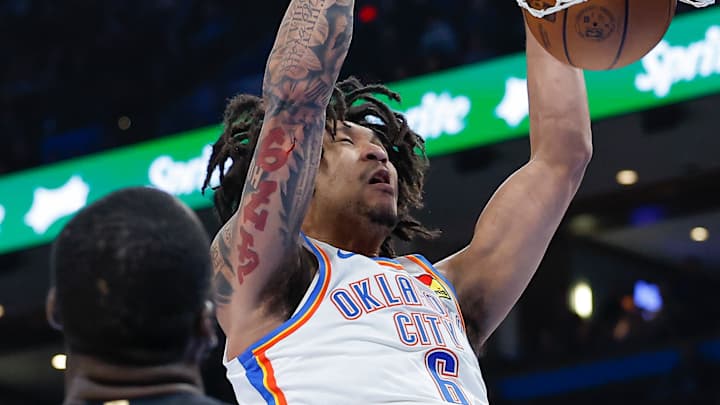Thunder's Jaylin Williams Is Flying Under The Radar

The Oklahoma City Thunder will likely see their prized rookie Jalen Williams end up on the NBA All-Rookie first team at the conclusion of this season, and deservedly so.
However, there's another J. Williams on the roster, who we need to talk about. Jaylin, the fellow rookie, is a 6-foot-10 big who has flown under the radar for most of the year, despite showcasing an offensive game that could make him a breakout candidate in future seasons.
On the surface, you might scoff at his 5.6 points per game in 17.6 minutes per game. Even on a per-minute basis, that's fairly low production.
Well, let's set aside volume for now and instead look at the scoring foundation he's got working for himself.
Williams has an uncanny touch on the inside, using a variety of double-clutching layups, finger-rolls, spin moves, and he loves - LOVES - to take push-shots from around 8-10 feet.
He's converting at 61.8% within three feet, so let's not pretend as if his finishing doesn't need work, but the raw skill set is there, and as the speed of the NBA game becomes second nature to him, the higher the likelihood of him realizing when the time is right for good shots.
From the outside, Williams is more patient. He'll wait for defenders to sag way off him to move around and make himself available. As a result, he's canned 28 triples in 34 games, and hitting 40% of his attempts on the season. From the long two area (beyond 16 feet and up to the 3-point line), he's hitting a ridiculous 69.2%, but on low volume.
The shot looks incredibly consistent as it's the same release and follow-through every single time. While his entire motion looks a tad slow, he's quite adept at getting the shot off quickly. Sometimes he'll get defenders to bite on quality shot fakes, leveraging his long-range game into drives to the basket.
Williams plays a simple brand of basketball where he takes good quality shots from the outside, doesn't rush deep looks, and understands how to provide the necessary spacing for his teammates. He'll move to the right areas of the court if for example Shai Gilgeous-Alexander or the aforementioned other Williams are slashing to the basket from a specific angle.
The Arkansas product isn't a major leaper, and mostly plays below the rim, and likes to use the glass for safety. He still needs some polish down-low, but the willingness to play a safe brand of basketball is going to serve him well.
Williams' calling card was never offense, which is why it's interesting to see how fluid a scorer he actually is at the NBA level, allowing him to potentially exceed his perceived potential.
Defense was primarily what Williams was known for in college, making the SEC All-Defensive first team, off his versatility in guarding both the perimeter and interior.
In the NBA, the added spacing and more agile perimeter players haven't exactly made life easy on him when guarding the perimeter, but nothing suggests he isn't capable of evolving to guard them at a high level. He closes out well on shooters, and isn't overzealous on the perimeter when he's moving his feet, but he will get beaten by smaller, and quicker, players.
On the interior, he's still finding his way toward consistency, but the upside is incredibly obvious. The NBA is a pick-and-roll league with players cutting in from the corners, which you don't see to the same extent in the college ranks, where zone remains heavily in use. Williams, at this point, will occasionally get caught in no man's land trying to guard everything at once, but he makes up for it by having a tremendous knack for drawing charges when he gets a solid overview of the court and spots the play.
Williams has drawn 25 charges on the season, an astronomically high number for someone with just 34 games to their name. He's particularly good at drawing them when opponents isolate against him, which gives him time to analyze where opponents are going, and putting himself at the right spot.
(Players ducking in from the weak side is an area where he still needs to adjust, but that should come in time.)
The ability to draw charges further shows his willingness and desire of wanting to become a good defender, by sacrificing his body to the extent that he does. He's actively seeking to prevent easy scores, but often commits too early to a rotation, or is outright overwhelmed by opposing creative talent, that forces him further out than where he needs to be.
In fairness to Williams, 34 games isn't a lot of experience. He's likely going to finish the season with less than a thousand minutes of playing time, so minor growing pains are to be expected. At this stage, you'd want to see the motor and the skill level. And given his ability to draw charges, no one can question the motor.
Additionally, Williams is a quality rebounder, and his 4.8 boards per game in limited minutes come from an active body who aggressively boxes out, and he's just got a nose for where the ball is going to end up.
Jaylin isn't as ready as Jalen yet, but there's something there. It wouldn't shock me if by next season, he looks like a proper, full-time rotation player who will force Mark Daigneault to play him well over 20 minutes per game.
Unless noted otherwise, all stats via NBA.com, PBPStats, Cleaning the Glass or Basketball-Reference. All salary information via Spotrac. All odds courtesy of FanDuel Sportsbook.
Want to join the discussion? Like Draft Digest on Facebook and follow us on Twitter to stay up to date on all the latest NBA Draft news. You can also meet the team behind the coverage.
